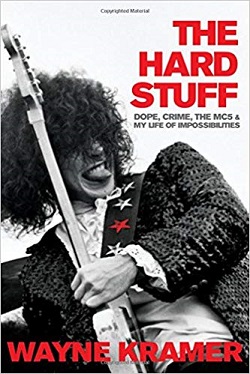 It’s a truism that stated fact sits at one end of the scale and fiction at the other, with the truth lying somewhere in-between. Ex-MC5 guitarist Wayne Kramer has been a divisive figure at times - the stillborn “A True Testimonial” documentary, anyone? - so parts of his story will be disputed by some.
It’s a truism that stated fact sits at one end of the scale and fiction at the other, with the truth lying somewhere in-between. Ex-MC5 guitarist Wayne Kramer has been a divisive figure at times - the stillborn “A True Testimonial” documentary, anyone? - so parts of his story will be disputed by some.
Ultimately, though, it’s pointless buying into all that. “The Hard Stuff” is Kramer’s own story and it’s told from his own perspective. None of the other people still standing are offering alternative perspectives (although the posthumous autobiography from bandmate Mike Davis is out there, too.) On its merits, “The Hard Stuff” is a rollicking read with only a few stones left unturned.
The plotline for dummies: Kramer’s the working class Detroit kid from a broken family who shook off the handicap of an abusive stepfather and forged his own musical way. He was a founding member of the radical chic MC5 and remains a compellingly lyrical guitar player who’s influenced countless others.
“The Hard Stuff” takes us through the rise and fall of the 5, Kramer’s slide into crime, his imprisonment for drug dealing, ongoing battles with booze and smack, career revival and personal redemption through hard work and love.
Much of the Wayne Kramer story has been heard before. Of all the players in the halcyon late ‘60s/early ‘70s Detroit Grande Ballroom scene, Kramer’s been the man most likely to pop up in the music media over the last 20 years - apart from Iggy of course. And with good reason: The man gives great interview. His verbalisation of events can be as explosive as his guitar playing. It’s not a stretch to say his performance in that MC5 doco (you know – the one that you probably won’t legally see) brought it to life.
That colour doesn’t always translate to the page. “The Hard Stuff” scrimps on the detail that a hard-core fan craves. Where’s the dissection of the Chicago Democratic Conference riot, or the perplexing partial reunion for the Rob Tyner memorial show? Kramer’s past comments on Fred Smith’s fade previously raised hackles of the late guitarist’s family so maybe he didn’t want to go there. What he does say about Sonic Smith is warm and generous.
But how did Brother Wayne get mixed up recording with the likes of GG Allin. Presumably, it was for the coin but did they use separate studio bathrooms? Did GG flush? What was the appeal (sorry) of working with David Peel and exactly how does an anti-capitalist anarchist pay his sidemen?
Gang War’s rocky career path gets good air-time and so do the trials and tribulations of the DKT/MC5 roadshow in the ‘00s. We now know - officially - why the slightly lost Evan Dando ever-so-quietly slipped out of the line-up and how divisions opened between Wayne and his brothers, Michael Davis and Dennis Thompson.
The MC5’s own slide into disillusionment is well told, as is the group’s falling out with benefactor John Sinclair. Kramer’s relationship with Sinclair seems to be the most enduring of any in the book.
Kramer’s own stance for a more enlightened approach to drug prohibition is made clear, as is his championing of prisoner rehabilitation through music.
Pointedly, however, there should have been more insights into the music. This is the lost opportunity. We knew Jon Landau homogenised the sound of “Back In The USA” (and instilling a sense of order was probably necessary for the band to keep going) but the songs on that disc were some of rock and roll’s most lyrically subversive - ever. Here was a chance to take us inside them.
Why not more about more about the crowning glory of “High Time”? On what’s been said here, I want to hear the tracks recorded for the “Gold” soundtrack that never surfaced. Thanks for teasing me.
There’s an interesting divergence behind the making of “Back In The USA” and the experiences of Kramer and Mike Davis. The Davis book talks about the ignominy of being relegated to the sidelines for his bass parts. It undoubtedly played into his own insecurities and pushed him towards hard drugs. Kramer’s version is very “means to an end”. As much as he regarded his bandmate as a brother, the record needed to be made and ruthlessness needed to win. It’s also the first mention of Dennis Thompson using a click track to assist his parts.
You should know that Kramer’s solo albums for Epitaph were some of the best things about the ‘90s (the first one, “The Hard Stuff”, and the murderously great live, “LLMF”, especially) and the story of a “heritage” musician on a younger men’s label is well told. Kramer was cut a lot of creative slack and ultimately went in a different direction.
It’s water under the bridge but “Citizen Wayne” and its mix of Don Was-produced loops and eclectic sounds should have opened up a whole new market. Kramer was fortunate to subsequently make dollar in soundtracks, even if that meant most of us heard less of him.
At age 70 and spruiking his old band’s legacy on the back of European and US tours by his latest project MC50, Wayne Kramer doesn’t have a lot to prove. “The Hard Stuff” is a good read but here’s an intriguing thought: What sort of book would it had been if written with his late mate and musical collaborator, Mick Farren? Sadly for both of them, we’ll never find out. 3/4
3/4

